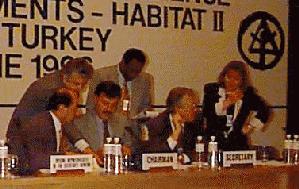|
|
|
Late Breaking News on Habitat II
Last updated 11 June 1996 --

|
For the second day Working Group II debated implementation and follow-up of the Habitat Agenda, focusing on the role of the UN Centre for Human Settlements and the UN Commission on Human Settlements. The G-77/China continued to propose central and extensive roles for the Commission and Centre, while the US, EU, Australia, Canada and New Zealand argued for more limited roles. Australia proposed that the private sector, local authorities and NGOs be added to governments and UN bodies in the section on international implementation. The G-77/China countered that NGO and other groups' participation should not be equated with governmental and intergovernmental actions and thus should be delineated in another section. The US suggested that the Habitat II decisions be consistent with ongoing UN reform, but the G-77/China said the Conference could not be bound by an incomplete process.
Details on debate from the Conference's seventh day are in Monday's Earth Negotiations Bulletin's from Habitat II.
 |
- Monday, 3 June (en français).
- Tuesday, 4 June (en français).
- Wednesday, 5 June (en français).
- Thursday, 6 June (en français).
- Friday, 7 June (en français)
- Saturday, 8 June (en français)
- Sunday, 9 June
ENB will not be covering most of the Plenary statements. These statements and press releasesare available on the Conference Secretariat's WWW site.
Here is the conference document that is being debated in Istanbul.
---------------------------------
The Third Session of the Preparatory Committee for the UN Conference on Human Settlements (Habitat II) ended in New York during February. Although the spirit of negotiation was good, procedural bottlenecks and the volume of work to be finished produced less than favorable results.
The Earth Negotiations Bulletin prepared a comprehensive summary of the Third Session of the PrepCom, which includes an analysis of the process through PrepCom 3.
In addition, we have posted RealAudio recordings of the final statements If you have any late-breaking news, updates or recent material on Habitat II, send us e-mail at enb@igc.apc.org
We published daily issues of the Earth Negotiations Bulletinin French and English from New York. Our daily issues are 2000-word summaries of the official proceedings.
Here is a link to the UN's gopher for press releases on Human Settlements.
